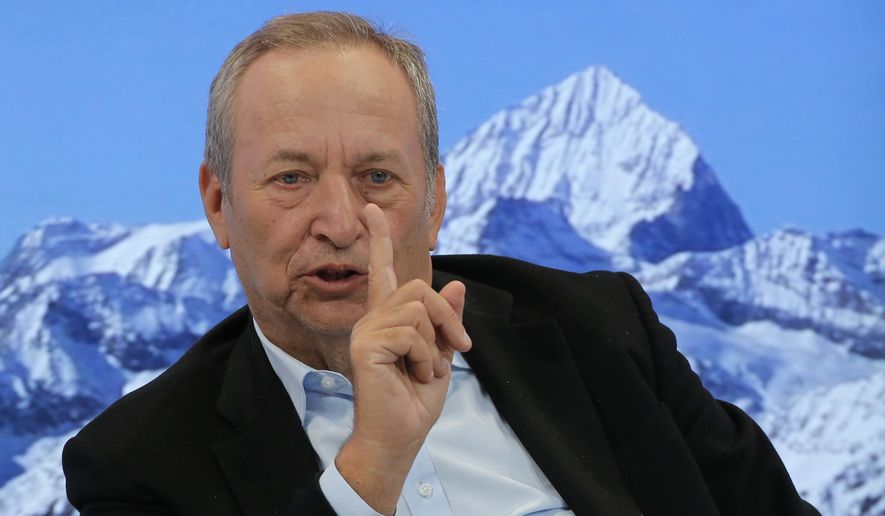The Biden administration’s widespread antitrust crusade is adding to the nation’s inflation crisis — not alleviating it as the White House claims, warned Larry Summers, a former Treasury secretary under President Bill Clinton.
Mr. Summers accused President Biden of “science denial” when it comes to the president’s plans to combat inflation.
“The emerging claim that antitrust can combat inflation reflects ‘science denial,’” Mr. Summers, a Harvard economist who also served as the top economic adviser in the Obama administration, wrote in a series of tweets on Monday. “There are many areas like transitory inflation where serious economists differ. Antitrust as an anti-inflation strategy is not one of them.”
The White House did not respond to a request for comment.
Struggling to address soaring inflation, Mr. Biden has argued that a lack of competition in some sectors has artificially raised prices. The administration is currently investigating the meat, oil, retail industries for potential anti-competitive practices.
Mr. Summers said the root cause of inflation was the labor shortage. Instead of cracking down on consumer industries, he argued that the administration should reduce its emphasis on buying American-made products. He said looking for cheaper, foreign-made goods, lowering tariffs and reducing red tape on businesses will lower prices.
He took issue with the administration’s targeting the meat industry, saying it will harm consumers and the industry itself.
“Breaking up meatpacking would in the short run lead to reduced supply which would further increase prices,” he wrote. “In general, when government goes to war with industries, it discourages investment and subsequent activity.”
Mr. Summers added that the administration has “little chance” of winning its case against the meat industry.
“If, for example, Walmart had been stopped from expanding, or Amazon had been kept from entering new markets, prices would be higher, not lower today,” Mr. Summers continued.
Mr. Summers also pointed out there has been little change in corporate consolidation as inflation soared to its highest level since the 1980s. In November, inflation as measured by the consumer price index, jumped to 6.8% from the previous year.
In contrast, between 2010 and 2019, prices rose an average of less than 2% per year, according to data from the Federal Reserve Bank.
The White House has blamed “corporate greed” for the price increases, saying that that, not inflation, has contributed to rising prices, singling out the meat industry.
Mr. Biden instructed Agriculture Secretary Tom Vilsack to investigate whether the meatpackers that control the largest share of the poultry, pork and beef markets, are profiteering off the pandemic. The White House has alleged the meat companies have colluded to raise prices while underpaying farmers.
“That is an area — one where people go to the grocery store and they’re trying to buy a pound of meat, two pounds of meat, 10 pounds of meat, it is — the prices are higher,” White House press secretary Jen Psaki told reporters this month.
“You could call it ‘corporate greed.’ Sure. You could call it ‘jacking up prices during a pandemic,’” she said.
Beef prices have increased 20% between October 2020 and October 2021. Pork prices increased by 14% during the same period, according to the most recent data from the Bureau of Labor Statistics.
Meat producers said they are being unfairly targeted by the administration. Their businesses have been impacted by multiple factors, including having to shut down production at the height of the COVID-19 pandemic, forcing them to cull cattle and other livestock, they said.
They also claim to be victims of the labor shortage, which has reduced their ability to process meat at the same pace as before the pandemic. That has created a scramble to meet increased demand for beef from both consumers and reopened restaurants sending prices north.
The meat industry isn’t the only sector where the Biden administration is cracking down on what it views as anti-competitive practices.
In July, Mr. Biden signed an executive order boosting antitrust enforcement of drug companies saying it led to high prescription drug prices. In October, he ordered the Federal Trade Commission to probe whether “illegal conduct” by the oil and gas industry is the cause of high gas prices.
Mr. Biden last month ordered the FTC to investigate whether retailers were taking advantage of the supply chain crisis to raise prices.
Even smaller agencies have gotten into the act, with the Federal Maritime Commission probing whether shipping companies have jacked up prices amid supply chain chaos.
In his tweetstorm, Mr. Summers countered that such probes are counterproductive.
“Monopoly may lead to high prices but there is no reason to expect it to lead to rising prices unless it is increasing. There is no basis whatsoever thinking that monopoly power has increased during the past year in which inflation has greatly accelerated,” Mr. Summers wrote.
• Jeff Mordock can be reached at jmordock@washingtontimes.com.




Please read our comment policy before commenting.